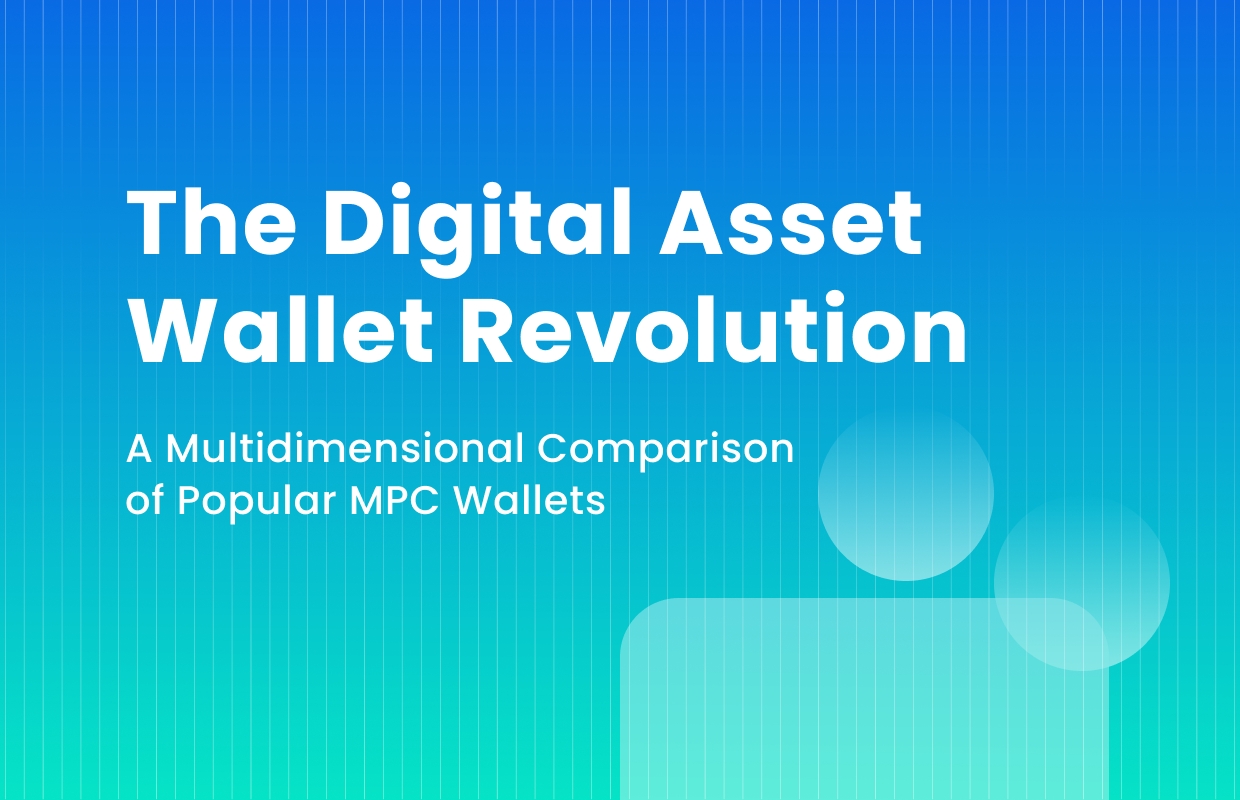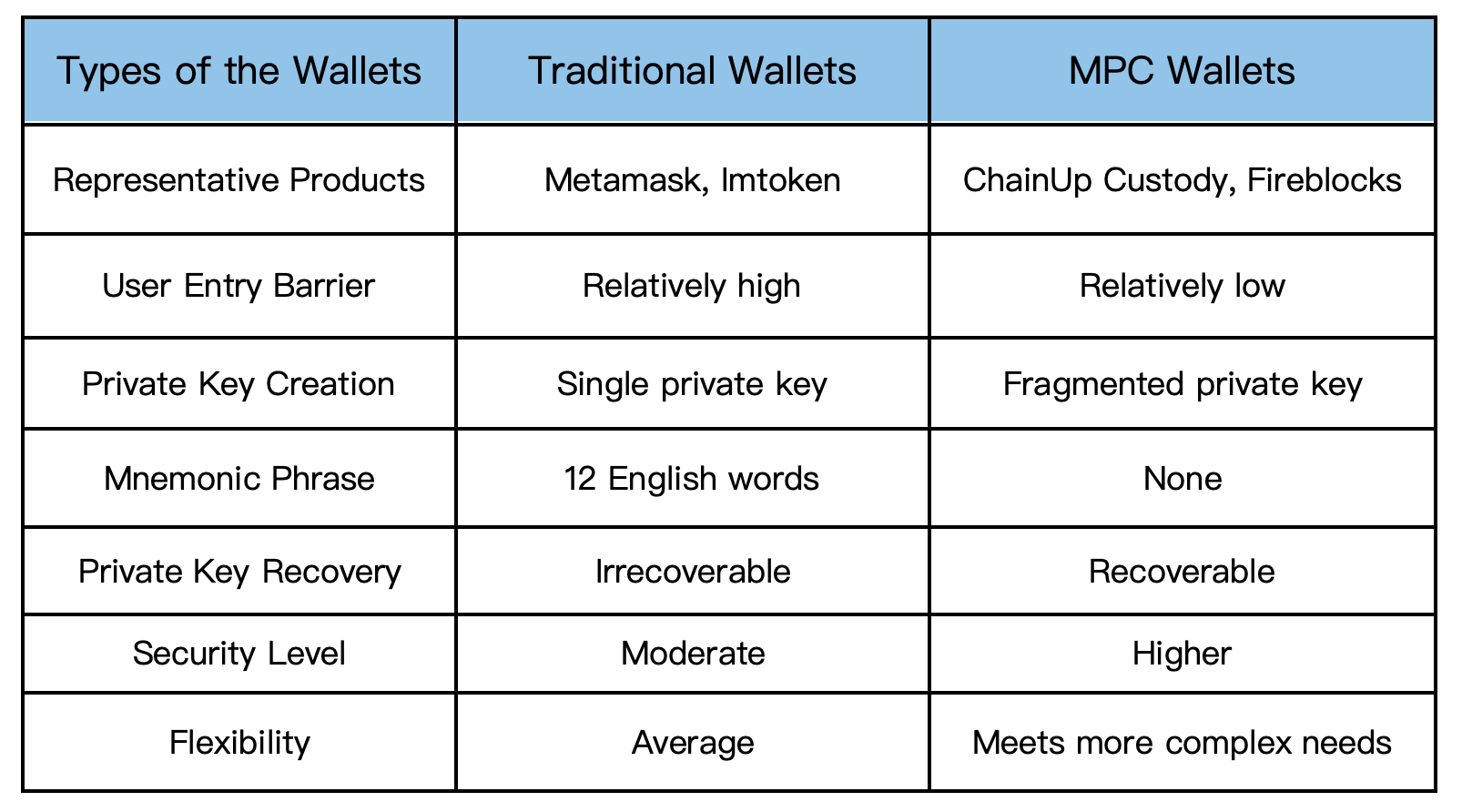The landscape of digital asset wallets is undergoing significant transformation. With the advent of Web3.0, there have been increasing infrastructure requirements and notable challenges. Digital wallets, being primary access points to digital assets, are often the targets of malicious attacks and face problems such as lost private keys. This has led to a demand for more secure and user-friendly decentralized wallet solutions. In response, numerous crypto companies are striving to develop wallet products that resonate with contemporary needs, signaling the evolution toward the Wallet 2.0 era.
Two innovations in this space, MPC wallets and smart contract wallets have been recognized as next-generation solutions, particularly in addressing the challenge of private key management.
MPC wallets, with their compatibility, privacy, and cost-effectiveness, are increasingly being viewed as promising off-chain solutions for near-term implementation. This is evident from the emergence of consumer-facing products like UniPass and ZenGo. Additionally, seasoned industry entities such as ChainUp Custody are integrating MPC technology into their digital asset custody services.
The question arises: Why is there a growing interest in MPC wallets? How do they stand out when compared to conventional wallets? Several entities are participating in this domain, each offering unique features. This exploration aims to provide insights into the essence of MPC wallets, trace the journey from Wallet 1.0 to 2.0, and highlight the potential benefits of the emerging wallet generation for the industry.

1. The Decentralized Private Key Approach of MPC Wallets
1.1 What is an MPC Wallet?
MPC, or "Multi-Party Computation," is a cryptographic technique that originated in 1982. It involves multiple participants collaboratively achieving a computational goal without any trustworthy third party. Each participant only knows their computational results and cannot access any information from other participants.
The integration of MPC technology with digital asset wallets achieves the goal of "decentralizing mnemonic phrases/private keys."
In the design of an MPC wallet, the private key is split into multiple segments and shared among various decentralized entities or platforms. Importantly, each of these participants holds only a piece of the private key, remaining unaware of the segments others retain. When a transaction demands a private key signature, these individual segments are collaboratively assembled to execute the sign-off. This decentralized approach to private key management effectively addresses concerns over its safekeeping. Thus, even if a fragment of a user's private key were compromised, intruders would remain unable to access the wallet's contents.
1.2. Advantages of MPC Wallets

(Comparing MPC Wallets with Traditional Digital Asset Wallets)
The landscape of digital asset wallets is rapidly transforming. In comparison to the inaugural generation of digital asset wallets, typified by tools such as Metamask, the emergent second-generation wallets, epitomized by MPC wallets, present several distinct advantages:
Elimination of mnemonic phrases: MPC wallets have a lower entry barrier
One notable stride MPC wallets have taken is the elimination of mnemonic phrases, reducing the complexity for newcomers. Historical wallet solutions necessitated a steep learning curve, requiring users to grasp intricate concepts like mnemonic phrases and private keys and devote considerable energy to their protection. Envision a future where newcomers to the Web3.0 domain needn't grapple with mnemonic phrases or the intricacies of private keys. Instead, they could harness familiar authentication methods like email, Face ID, or fingerprint to engage with digital assets. This vision is being actualized by MPC technology, rendering complexities like mnemonic phrases obsolete. The intuitive nature of MPC wallets, leveraging familiar Web2 login techniques, has substantially reduced entry barriers, contributing to their growing traction.
Removal of single point of failure: MPC wallets offer enhanced security
Another critical advantage of MPC wallets is their resilience against vulnerabilities. Conventional wallets pivot on a singular private key; a compromise or loss of this key translates to lost assets. MPC wallets, by design, confront this vulnerability head-on. With features enabling private key recovery, users can rejuvenate or substitute private key fragments without deserting their primary wallet. In scenarios where a fragment is compromised, hackers cannot execute unauthorized transfers without acquiring multiple key segments. Such breaches allow users to promptly update their key fragments, rendering previous versions ineffective. By complicating unauthorized access mechanisms, MPC technology substantially augments wallet security. Users can interact with their assets without the perpetual apprehension of losing their keys, ensuring a stress-free experience.
Meeting complex requirements: MPC wallets address the challenge of self-managed assets
Given that a full private key never resides on a single device, corporate users find added security against internal threats and potential malfeasance. This protective layer discourages internal misappropriation of digital assets and ensures that even if one device is compromised, assets remain secure.
The crypto adage, "Not your keys, not your crypto," has gained prominence, especially in the wake of incidents in FTX insolvencies. As trust in exchanges wavers, individuals are gravitating towards wallets as the prime tools for asset management. This transition, however, isn't without its challenges. Traditional wallets are susceptible to a gamut of threats, from private key theft to phishing. While hardware wallets offer a semblance of security, their cumbersome nature isn't conducive to frequent transactions. MPC wallets adeptly address these concerns. They empower users with ownership over their private keys while obviating associated management challenges. Additionally, they cater to the intricate asset management requisites of enterprises, thanks to their flexible signing mechanisms and other nuanced features.
Given these undeniable advantages, MPC wallet solutions are now frequently used by digital asset funds, home offices, exchanges, custody service providers, and various DAOs. There's a burgeoning consensus that this approach will soon permeate the broader user base.
Subsequent sections will delve into key players in the MPC wallet space, elucidating their unique offerings and juxtaposing them to offer readers a comprehensive perspective on the evolving digital asset wallet ecosystem.
Read more in full report
Comparison of Popular MPC Wallets
Service Group & Custody Model
Wallet Disaster Recovery Mechanisms
Bright Future for MPC Wallets